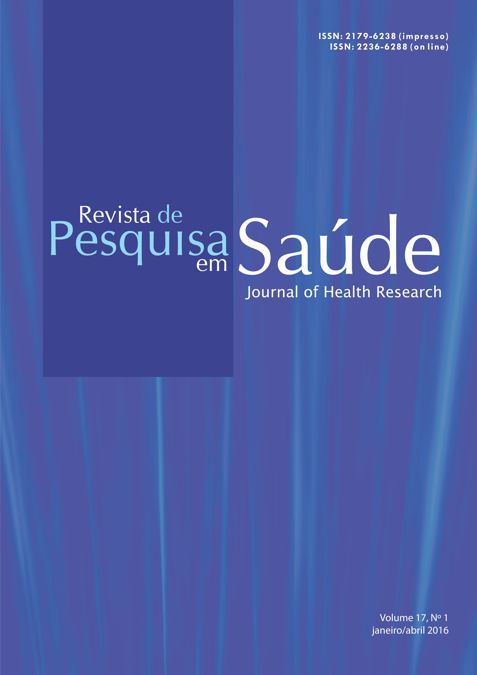CARACTERIZAÇÃO DO ALEITAMENTO MATERNO EM SÃO LUÍS, MARANHÃO / CHARACTERISTICS OF BRESTFEEDING IN SÃO LUÍS, MARANHÃO, BRAZIL
Abstract
Introdução: O aleitamento materno é a estratégia isolada que tem o maior impacto na redução da mortalidade infantil e a heterogeneidade dos indicadores entre os municípios de um mesmo estado, e até entre as diferentes regiões do país é de grande relevância. Objetivo: Caracterizar o aleitamento materno em São Luís (MA). Método: Trata-se de um estudo transversal, cujos dados foram coletados por meio de entrevistas. Resultados: Foram analisadas 3.306 mães, a maioria tinha entre 20 e 34 anos de idade (73,63%), eram pardas/mulatas/morenas (68,28%), possuíam de 9 a 11 anos de estudo (62,61%), viviam em união consensual (54,34%), 62,91% não exerciam atividade remunerada, 14,39% consumiram álcool durante a gravidez e 3,53% fumaram. Quanto às características da gravidez observou-se que 31,62% das mães planejaram a gravidez, 98,70% realizaram prénatal, a maioria em instituições públicas (83,38%), iniciando as consultas no primeiro trimestre de gestação (70,36%), 68,95% receberam orientação sobre aleitamento materno nas consultas de pré-natal e 62,91% tiveram o seio examinado. Em relação ao tempo de aleitamento materno, a maioria das crianças mamaram por mais de 24 meses (57,37%) e apenas 42,97% receberam o leite materno exclusivo até o sexto mês de vida; dessas crianças, 96,37% não frequentavam creches e 23,62% usavam chupeta. Conclusão: Vários aspectos podem influenciar a prática do aleitamento materno e sua duração. Portanto, é fundamental apoiar e ajudar as mães a iniciar a amamentação precocemente, afim de melhorar os índices do aleitamento materno e reduzir a morbimortalidade infantil no Brasil.
Palavras-chave: Aleitamento Materno. Saúde da Criança. Enfermagem.
Abstract
Introduction: Breastfeeding is the isolated strategy with the greatest impact on reduction of child mortality and the heterogeneity of indicators among cities in the same state and even among different regions of the country is highly relevant. Objective: characterize breastfeeding in São Luís, Maranhão, Brazil. Method: It is a cross-sectional study in which data were collected through interviews. Results: of 3,306 participating mothers, most were between 20 and 34 years of age (73.63%), were brunettes (68.28%), had 9 to 11 years of education (62.61%), had a consensual union (54.34%), 62.91% did not have a gainful occupation, 14.39% consumed alcohol during pregnancy and 3.53% smoked. Regarding pregnancy characteristics, 31.62% of participating mothers planned their pregnancy, 98.70% received prenatal care, mostly in public institutions (83.38%), initiating prenatal care in the first trimester of pregnancy (70.36%). 68.95% received orientation on breastfeeding during prenatal care and 62.91% had their breasts examined. Regarding the duration of breastfeeding, most children were breastfed for more than 24 months (57.37%) and only 42.97% received exclusive breastfeeding up to the sixth month; of these children, 96.37% did not go to kindergarten and 23.62% used pacifiers. Conclusion: Several aspects may influence breastfeeding and its duration. Therefore it is essential to support and help mothers initiate breastfeeding early, in order to improve breastfeeding indices and reduce child morbidity and mortality in Brazil.
Keywords: Breastfeeding. Child health. Nursing.








